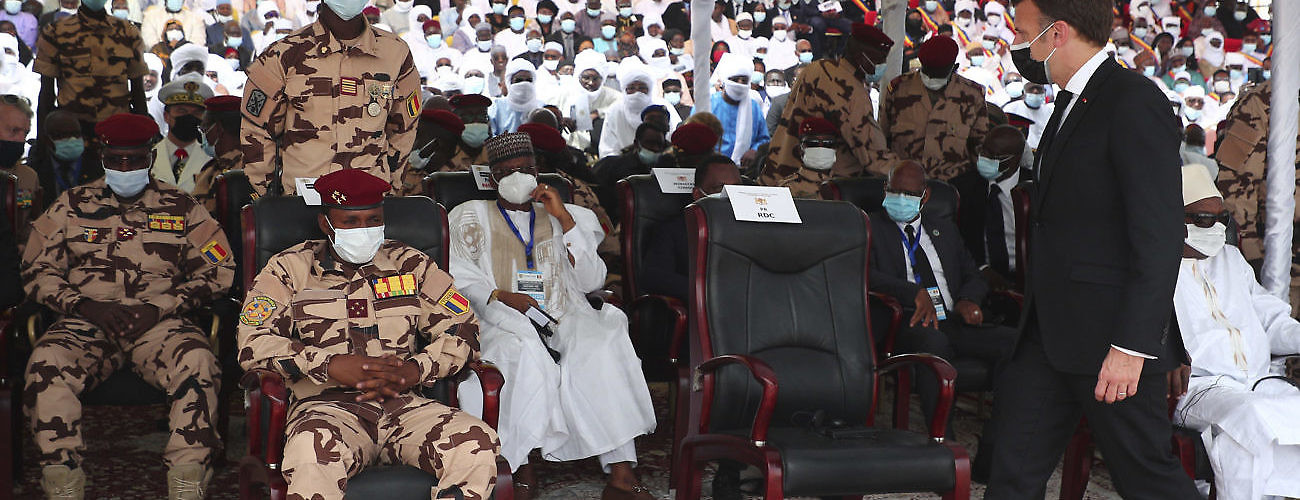French President Emmanuel Macron, right, walks past Mahamat Deby, son of the late Chadian president Idriss Deby, left, as he arrives to attend the state funeral for the late Chadian president in N'Djamena, Chad. (Christophe Petit Tesson / Pool photo via AP)
The recent death of President Idriss Déby of Chad—and the forceful takeover of power by military officers led by his 37-year-old son, Mahamat Déby—could further destabilize both the Sahel and the Lake Chad region. According to the Chadian army, the 68-year-old leader died on April 20 when government forces clashed with the Front for Change and Concord in Chad (FACT) rebel group near the town of Mao, in the country’s central Kanem region. Some observers have raised doubts about the claim, suggesting that Déby was assassinated by the military.
Déby, who had just been reelected for his sixth consecutive term in office, was also commander-in-chief of Chad’s military; one of the largest and most well-resourced militaries in West Africa. Although his 31-year rule was marred by accusations of corruption and widespread poverty, Déby provided crucial support to Western countries in their counterterrorism efforts against Islamic militant groups in the Lake Chad Basin and Sahel. Much of his little but notable military achievements were as a result of the support he received from these Western partners, particularly France and the United States. His demise creates uncertainty regarding the fight against extremism.
Of France’s 5,100 troops based across the Sahel region, about 1,000 soldiers, along with a few Mirage 2000 fighter jets, are reportedly based in N’Djamena, which is the headquarters of the European nation’s Barkhane counterterrorism operation for the Sahel region. In addition, France has an operating base in northern Chad’s largest city of Faya-Largeau and another in Abeche town close to the eastern borders with Sudan and Central African Republic.
France, which defended the Chadian army’s takeover of power shortly after Déby was killed, looks set to continue its operations in the country and will like continue to give assistance to the troops Chad provides to the G5 Sahel regional military campaign. It is unlikely that the United States, which last year gave vehicles and equipment worth $8.5 million to Chad’s government as part of a total $28 million support package for the military, will continue its support for the military regime. This especially since there is no clear-cut plan on how to deal with the political, ethnic, and security challenges that Chad is currently facing.
In fact, the uncertainty around Chad’s future and the military’s takeover being widely perceived as illegitimate means that the country is likely to lose other partners it had in the international community. A similar situation occurred in 2012 when Germany ended its bilateral development cooperation with the Chadian government after it was unwilling to embark on reforms. The at least six counterterrorism agreements recently signed by Déby with France, the US, Turkey, Israeli, Russia, and Saudi Arabia, will almost certainly be reconsidered or renegotiated, if not nullified.
Under Déby, Chad also received direct financial support from the United Kingdom, Russia, and the European Union for its annual budget, military training, arms, and non-lethal equipment supply. To Déby’s credit, Chad’s military earned praise from the international community for showing strength in the fight against insurgents in the region. It was largely believed that these successes were due to the complete control and loyalty that Déby had from the military, whether genuine or not. But some of his excesses—including discrepancies in the treatment of elite military officers compared to other troops, and appointing mostly people from his own Zaghawa ethnic group into top military positions—seem to have created strong enough rifts that resulted in the apparent coup. Lingering tensions around the approaches Déby took with the military could pose a huge challenge for his son.
Given Idriss Déby’s military policy, it doesn’t seem his son and successor, Mahamat Déby, has inherited a unified military. Already there are fears within the country that command and control over the armed forces may falter, especially as it has been reported that some senior officers are unhappy that another Déby is ascending to power. There are worries the younger Déby may continue along the same lines as his father, and perhaps be even more authoritarian.
Should the rifts in the military persist, Islamist insurgents could seize the opportunity to further destabilize the country. The subsequent loss of Chad as a strong player in the fight against Islamist groups will also increase demands on other militaries in the region, who may or may not be able to shoulder increased engagement in regional counterterrorism efforts.
This is particularly relevant for the Nigerian military’s operations against Boko Haram, which the Chadian military has also been fighting. Another example is in the Liptako Grouma region between Burkina Faso, Mali, and Niger. Before his death, Idriss Déby deployed troops to the region following a request by France, but the soldiers were recently recalled to tackle rebels part of FACT. Such recalls could become regular practice if the security situation in Chad deteriorates and the military is pressured to weigh domestic concerns against regional priorities.
At this point, the military and government seem stable, but given the length of Déby’s reign it may take some time before the opportunities that his death affords his rivals are taken advantage of. Should the worst come to pass for Chad and its military, Islamist and extremist groups in the region will likely strengthen, placing thousands of people in the Lake Chad basin and Sahel at risk, and complicating the military arrangements made between Western governments and those in the region.





